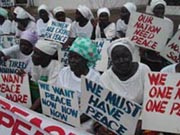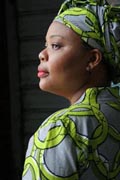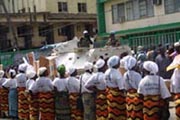Brandon Judell Pray the Devil Back to the Hell :An Interview with Director Virginia RetickerPray the Devil Back to the Hell
In 2003, a group of Catholic and Muslim women in Liberia got together to stop a civil war that was destroying their country, and they succeeded. Last November, a startling film, Pray the Devil Back to Hell, documenting their story opened in Manhattan. Emmy-Award wining director Gini Reticker's remarkable effort clearly works on every cinematic level at once: it educates, it astounds, and it convinces you that you can make a difference. From a tyrannical leader to child rapists, from the bombing of the infrastructure to starvation, from immeasurable fear to immeasurable courage, Pray the Devil covers it all. And this film has become more that another line on Reticker's resume. The acclaimed documentary has become a central part of her life and that of her producers. If you don't believe me, just check out praythedevilbacktohell.com. And even though you can now purchase Pray the Devil on DVD (and you should), it continues to play at festivals such as the Palm Springs International and in cities and towns around the country such as Sedona, AZ (Feb. 26 and 28), Minneapolis (Feb. 27-March 5), and Rockland, ME (March 14). To learn more about the why and the wherefore of this documentary, Reticker and I had a nice little phone chat a few weeks ago.
BJ: You have had terrific feedback for Pray the Devil Back to Hell. GR: Yes, we've had really extraordinary reactions wherever we've gone, which has been incredibly rewarding for me as a filmmaker. We've won festival awards and we were on the shortlist [for the Oscar], which was great. We have also played the film internationally. So it's been pretty incredible all across the board. BJ: What do you think the attraction's been? I'm sure most Americans have no idea where Liberia is. GR: One is that it is a really hopeful film. So it's not a film where people are going to go, "This is really horrible and what am I going to do?" People are really inspired by the film. Also religious communities really relate because it's about people of different faiths coming together to overcome adversity in a nonviolent way. And I think women's groups really relate. And it's also a film that moves quickly. It's like an action film. It's a war story but told from a completely different perspective. So I think for all of these reasons, we are getting great responses. BJ: Right, it's totally engrossing. You don't feel like you watching it as a good deed. GR: For me, the thing that's so great about having a story like this to tell as a filmmaker is it's an inherently dramatic story. Trying to capture that--and even though it's already happened--we really made an effort to try to make it so the audience was experiencing the events as they were unfolding in front of them. BJ: What the reaction to the film in Liberia? Were you able to show it there?
GR: We were only allowed to show it once. We showed it a week after we won the Tribeca Film Festival Best Doc. We showed it to 300-400 women who had been active in the campaign. It was an amazing reaction. Partially, you know, it's that [the former dictator] Charles Taylor is still active. People are still both laughing at him and are afraid of him at the same time. So he's still very big in Liberia. His whole legacy. The other thing that was really rewarding was that the women who had participated felt like that by seeing themselves on film that it validated what they had done and made it really big. And it made it historical, and now the rest of the world would know. We're planning to go back to Liberia the beginning of March on International Women's Day. There's actually going to be a gathering of 3000 women from all over the world there. We're going to show it there, and from there we're going to have a much longer run in Liberia. BJ: Are things better in Liberia now? Is there still widespread unemployment and violence? GR: Things are a lot, lot better. There's not like war, but there are certainly still criminals around. I've been back a few times since we've made the film, and every time I go back things are getting better. Streets are cleaner. Streets are being repaired. There's now electricity in some parts of the capital where there have been none for 15 years or longer actually. Some places are getting running water. There's investment coming in. So things are getting better: the trick is getting things better as fast as possible. BJ: As opposed to just making a documentary, screening it, and then moving on, this is more than just a film project film for you. This has sort of become a way of life. What do you think the aftermath will be, and how long will you go on with this? GR: Well, obviously, of course, the greatest aftermath would be world peace, but actually there's an outgrowth from this project. Abbie [E. Disney] and I are going to co-produce a 4-part series on WNET, a Wide Angle on women, war, and peace. I think that the story that we told in this film about what women are doing all over the world for peace and to put an end to violence is not often told and yet is happening in many places. So, yes, I feel I'm going to be on this for the next number of years. BJ: I've read that unemployment in Liberia is 85%. Can that be true? GR: I think it's between 80 and 85%. That doesn't surprise me. BJ: With 76% of the population living below the poverty line, AIDS cases have grown from 1% to 6-12% of the population. GR: When you're there, you can see it. Without being there, it's hard to wrap your mind around. You have to understand there was a civil war for 14
years. That just doesn't mean no one's putting money into the infrastructure, but, in fact, the infrastructure is being destroyed. So the first act of war. . one of the first things they did was blow out the electricity. Then they blew out the water. Then kids didn't go to school for 14-15 years. And things were bombed and fired upon. It's kind of just startling to see. There are a lot of people basically just living upon the ruins. It's a really big job. A huge job. At the same time, it's an incredibly resource-rich country. Liberia's got minerals. It's got timber. It's got iron ore. And all of our Firestone tires come from these huge rubber transplantations there, and it's only 3 million people. So there are resources to make these happen and to get back on track. But it will take awhile. They've regressed 50 years, I think. BJ: When you started this documentary, you must have thought the story is great, but are there enough visuals to relate it. How important was that? GR: It was hugely important because I guess when I first started making the film, I didn't realize that I'd be using as much archival material as we did. But it really became apparent that it was impossible to understand what the women did unless you understood the context that it happened in. So getting a hold of archival material was really, really important. One of the most interesting things about making the film was that I literally cannot tell you how easy it was to come across footage of the war: boys with guns and a lot of horrible things that actually I didn't put into the film. I looked at more grotesque violence than anyone should have to look at in her entire life. It was a really horrible period of making the film. But there was virtually no footage of the women. Every bit of footage we could find on the women is included. But there was about two weeks worth of material of violence. The story of what is looked at in war and what the camera looks at is a very interesting kind of thing. BJ: Do you think the blockade of visuals from the Iraq war as opposed to how the visuals of the Vietnam War had been released to the world has had an effect on the perception of the war? GR: A huge effect. A huge effect. I mean it's interesting. When you go to a lot of places I traveled to in Africa, they just have Al Jazeera running constantly like in the bars, etc. Al Jazeera doesn't necessarily even have newscasters. It's just literally the footage. And it is so shocking what you see [on that channel] and what we're not seeing [in the United States]. BJ: Looking back at the films you have made so far, it's clear none of them were designed to make you rich. GR: My husband has noticed that also. (Laughs) BJ: Can you keep going on like this? GR: I have to say I can do this because of him. He produces for 30 Rock. He totally supports me in what I do. I think I really have been able to have the career I have had because I haven't had to make it rich. Because I've been able to do the work that I wanted. BJ: That's why I tell my students that their first marriage is very important. GR: (Laughs) Well, it's not my first marriage, but it's my most important. BJ: Well, that good. You hit love and wealth at the same time. That is fabulous. GR: Love and support. We weren't always wealthy, but I feel like in a lot ways he supports the work I do because it makes him feel like he's in the work, too. BJ: Now is the next project cooking? GR: Yes, the next project is the 4- part series. BJ: Now how long is that going to take you? GR: Well, I guess the $4 million question is how long will it take us to raise the first couple of million dollars that we need to go into production. BJ: Excuse me, how many million? GR: Well, we need two million dollars to go into production. Our hope is that we will be on the air in 2010. So I'm hoping we will be able to achieve it all within two years. BJ: Now you worked with Michael Moore. Did that experience have a positive effect upon you? GR: Yeah, I worked with Michael on Roger & Me. I had been an editor for a short time. It was Michael's first film, and nobody on the film really had much film experience. I went actually down to help him finish. They had been working on the film for a long time. I saw a rough cut of it before. It wasn't done, and many people were telling Michael that he couldn't make it in time for the New York Film Festival. I think it was in May of that year. I loved the film and thought it could definitely make it. So I went down to Washington D.C. seven months pregnant to help him finish. Then I had a long history with Michael. My husband produced TV Nation, and my sister was an editor and worked with Michael. I admire his work immensely. BJ: Do you expect to be a finalist for the Oscars? Does anyone know yet? GR: No. It's totally impossible to know. Other than I understand we're in very good company this year. There are really a lot of excellent films on the short list. BJ: So you're keeping your fingers crossed? GR: Yes. (Sadly, Praying the Devil Back to Hell didn't garner a nomination.)
| museums | NYTW mail | recordings | coupons | publications | classified | |




